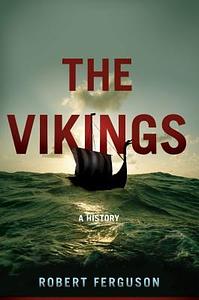Take a photo of a barcode or cover
Very interesting book but a rather difficult read. Early Middle Ages were very dynamic times where rulers and local warlords rose and fell in a matter of months. As a result you end up with multitude of characters and it takes pretty good concentration and focus to discern who is who at what time.
I read few reviews of this book and they said that book was sensationalistic in terms that it would bombard readers with pretty bizarre descriptions of torture. I agree that these are not things you would usually ind in historical texts but again these are all things that were common for the period. Brutal, yes they are [especially in our times] but they were common at the time.
Interesting book, highly recommended to anyone interested in Early Middle Ages or Vikings themselves.
I read few reviews of this book and they said that book was sensationalistic in terms that it would bombard readers with pretty bizarre descriptions of torture. I agree that these are not things you would usually ind in historical texts but again these are all things that were common for the period. Brutal, yes they are [especially in our times] but they were common at the time.
Interesting book, highly recommended to anyone interested in Early Middle Ages or Vikings themselves.
This is the type of book you need to read multiple times to really absorb it and appreciate the material. This was the first time I’ve read it, so I can only admit to remembering maybe 10% of the facts, but I have a very good idea of the trends and themes during the Viking Age. With a reread I’m sure I would remember more of the specific details. Something I really appreciated about this book was the author’s dedication to avoiding speculation. He was very honest about what information was available and mentioned all working theories where possible. I was listening to the audiobook, which made it a little harder to place events without ready access to a map, but the narrator was great.
I admit I didn't finish this book, but not for lack of trying. At some point I got tired of the sidetracks that the author takes all the time - they flow fairly well (most of the time) from one topic to another, but the only thing connecting two thoughts sometimes is a single word: he mentions horses once, so takes a three page detour about horses, in the horses talk he mentions sacrifices once so his next five pages are about sacrifices. It makes it feel like thoughts are never quite completed.
He also takes Snorri's work as 100% factual, despite coming at least 300 years after the end of the 'Viking period'. Using him as a source is understandable, and he wrote based on other sources, but there should be some hesitation for using him, a christian writing about heathens from 300 years before, without questioning his motives or assuming his own knowledge was correct.
The author also made some weird assumptions about certain things that I couldn't get over, and is ultimately why I stopped reading.
He also takes Snorri's work as 100% factual, despite coming at least 300 years after the end of the 'Viking period'. Using him as a source is understandable, and he wrote based on other sources, but there should be some hesitation for using him, a christian writing about heathens from 300 years before, without questioning his motives or assuming his own knowledge was correct.
The author also made some weird assumptions about certain things that I couldn't get over, and is ultimately why I stopped reading.
Brilliant book, loved it! It's well researched, full of information, covers absolutely everything one might want to know about the so called Viking Age, with the author staying objective throughout. Admittedly, it's so dense that it requires a lot of focus when reading it. There's a great deal of kings and battles and places to keep track of, so it might be hard to follow. Not something you'll just casually read on the bus. As much as I loved it, I can understand why someone would think it to be dry and boring. It's not really a book for the casual reader with a mild interest in the subject, it's a proper scholarly work with thoroughness and objectivity being it's main agenda, rather than entertainment. But if you're willing to put up with the enormous amount of detail, or you're even excited about it, it's the right book for you!
A more academic tome than Oliver's chatty introduction, [book:Vikings|16070774], but with some good additional detail (okay, sometimes too much). Ferguson arranges his narrative geographically, which means that the same names come up repeatedly in different chapters and at different dates. A timeline and list of characters, plus more maps, would have helped me. I am still astonished that the Vikings penetrated as far as Russia, Spain and North Africa.
Whew. That was a lot of names-dates-battles. I think I absorbed some info along the way, but man are my eyes sore.
Two major issues with this book:
1) It's supposed to be for the general reader, but only someone well versed in northern European (English/Norse/Icelandic etc) history would be able to make sense of all the characters, many of whom share similar names (Harald Hadrada, Harold Godwinson, Cnut, Harthacnut, Olaf, Olav, Olof...).
2) The repeated use of 'Heathen' to demarcate non-Christian Vikings. The word has historically been used as a pejorative; a term such as 'Pagan' still has the desired effect while remaining much more neutral.
That said, I still want to be a Viking when I grow up...
1) It's supposed to be for the general reader, but only someone well versed in northern European (English/Norse/Icelandic etc) history would be able to make sense of all the characters, many of whom share similar names (Harald Hadrada, Harold Godwinson, Cnut, Harthacnut, Olaf, Olav, Olof...).
2) The repeated use of 'Heathen' to demarcate non-Christian Vikings. The word has historically been used as a pejorative; a term such as 'Pagan' still has the desired effect while remaining much more neutral.
That said, I still want to be a Viking when I grow up...
I was hoping for more culture and less lists of battles + kings, but it was still interesting.
This book showed such initial promise, and I was particularly fascinated by the discussion of Viking law; however, I couldn't bring myself to finish it, for three main reasons:
1) The author consistently refers to the Vikings as Heathens. While I don't *believe* he intends this in a negative sense, the word *does* have negative connotations that can not be ignored.
2) The organization was poor and the digressions numerous -- within a page, the author had jumped from the importance of horses in Viking culture to a description of how ancient Irish kings mated with mares at their coronations. Erm?
3) The author makes some illogical claims. The one that most struck me was his note (page 39) that "Heathen religion was probably never understood systematically even by those who practiced it" and then points out people's belief in personal gods. Correct me if I'm wrong, but those personal gods make up part of their religion. You really can't say that someone doesn't understand their own religion: what they understand *is* their religion.
The book appeared well-researched, diligently cited, and doubtless contains some interesting information, but at this point, I'm giving up.
1) The author consistently refers to the Vikings as Heathens. While I don't *believe* he intends this in a negative sense, the word *does* have negative connotations that can not be ignored.
2) The organization was poor and the digressions numerous -- within a page, the author had jumped from the importance of horses in Viking culture to a description of how ancient Irish kings mated with mares at their coronations. Erm?
3) The author makes some illogical claims. The one that most struck me was his note (page 39) that "Heathen religion was probably never understood systematically even by those who practiced it" and then points out people's belief in personal gods. Correct me if I'm wrong, but those personal gods make up part of their religion. You really can't say that someone doesn't understand their own religion: what they understand *is* their religion.
The book appeared well-researched, diligently cited, and doubtless contains some interesting information, but at this point, I'm giving up.
Generally an enjoyable read, does get pretty name-heavy around the struggles between Heathendom and Christianity (which is funny because it reminded me of the OT). I did tire of reading about religious conversion, but this may be the fault of what history has preserved rather than this author's curation of Viking history. In any case, my interest is sparked and I'd like to read more books about the Vikings.



